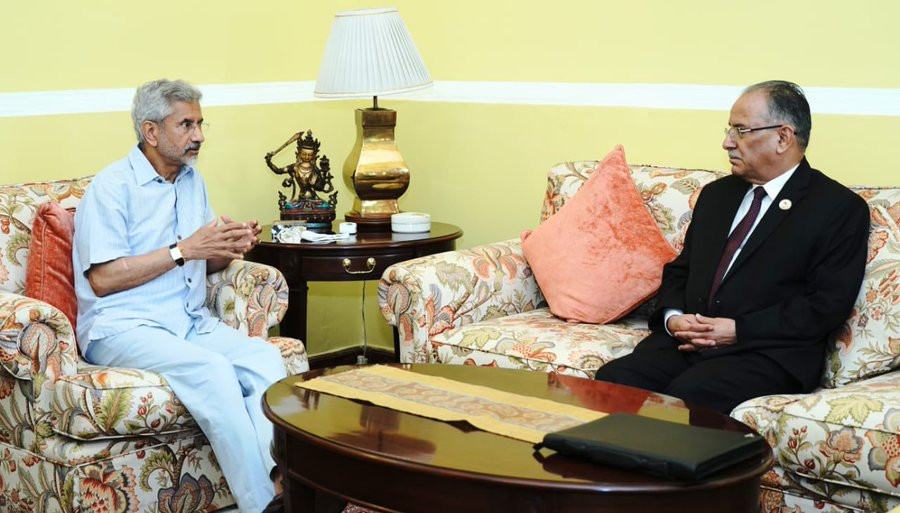Politics
In New Delhi, Dahal holds talks with Indian external affairs minister
The Maoist chair, who is in the Indian capital on a three-day visit, at a separate interaction calls for review of the 1950 treaty through dialogue.
Post Report
External Affairs Minister of India S Jaishankar held talks with chairman of CPN (Maoist Centre) Pushpa Kamal Dahal on Saturday.
Dahal is currently in New Delhi on a three-day visit.
“Pleased to welcome @cmprachanda to India on his visit at the invitation of BJP President @JPNadda ji,” Jaishankar tweeted after his meeting with Dahal. “A productive discussion on strengthening our neighbourly relationship with a focus on economic cooperation.”
Dahal reached New Delhi on Friday at the invitation of JP Nadda, the national president of the ruling Bharatiya Janata Party.
“Reflecting our Neighbourhood First policy, India will remain a steadfast partner of Nepal in its quest for progress and prosperity,” Jaishankar added.
Earlier on Saturday, Dahal met with National Security Adviser of India Ajit Doval.
Dahal addressed a function in Delhi on Saturday and attended a dinner hosted by Jaishankar.
On Sunday, Dahal is scheduled to meet with Indian Prime Minister Narendra Modi.
The Maoist chair will return home on Sunday after meeting with Nadda.
His visit to the south, termed political by experts and observers, is taking place soon after a Chinese delegation’s visit to Kathmandu, and just ahead of general and provincial elections in Nepal.
Nepal will go to the polls most probably in November, though the government is yet to announce the date. The Election Commission has already proposed November 18 for the two elections after successfully conducting the local polls in May.
The Maoist Centre has emerged as a key decisive force from the local elections, retaining its position as the third political party in Nepal. And from the upcoming elections, the Maoist party is likely to maintain its kingmaker’s position.
While the BJP seems to be in a bid to build party-to-party relations with the Maoist Centre, the Delhi establishment appears keen to engage Dahal, as communications with the Maoist leader had broken down over the last few years.
Observers told the Post on Friday that Delhi considers Dahal an important leader and must have invited him to assess contemporary politics in Nepal, the situation of the current coalition led by Prime Minister Sher Bahadur Deuba and the possibility of a left alliance.
Dahal is a key coalition partner of the Deuba government.
Nepali Congress leader Arzu Rana Deuba, spouse of Prime Minister Deuba, is also currently in Delhi. Dahal and Arzu met on Saturday morning at a tea reception organised by the Embassy of Nepal in New Delhi. Arzu reached Delhi a few days ago for medical treatment of one of her close relatives, according to Congress leaders.
On Saturday, addressing an interaction organised by Foundation for Public Awareness and Policy, Dahal hailed Nepal-India relations, saying they are founded on the age-old connections of history, socio-cultural traditions and people-to-people contacts.
He also stressed the need to resolve some outstanding issues through dialogue.
“There are some issues left by history that need to be addressed in good faith to fully realise the potentials of Nepal-India relations and the bilateral cooperation,” he said. “The matters related to the 1950’s Treaty, boundary and the EPG (Eminent Persons Group) report need to be resolved through diplomatic efforts and dialogue.”
“In the spirit of good neighbourliness, we can make our relations problem-free,” he added.
The EPG report, though finalised in 2018, has yet to be received by the prime ministers of the two countries, largely because of Modi’s “tight schedule.”
“Our two countries share a history of harmonious co-existence. Our relations are rooted in antiquity. The relations are deep and diverse, underpinned by mutual respect, cordiality and friendship,” said Dahal. “We are connected by geography as well as history, by languages as well as literature, by our common traditions as well as religions and by land as well as rivers. Not just history but also destiny has bound us together.”




 8.22°C Kathmandu
8.22°C Kathmandu














